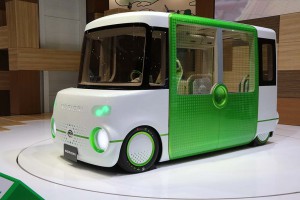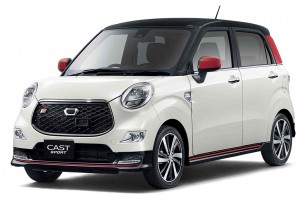Confirming earlier reports out of Japan, Toyota says it plans to buy out the remaining 48.8% of microcar maker Daihatsu that it does not already control.
The deal, which will strengthen Toyota’s hand in the minicar market in both Japan and emerging markets, will involve a stock swap worth about $3 billion. The takeover is expected to be completed by late July.
“We see this as the perfect opportunity to cement our relationship with Toyota, and, by doing so, to embark on a new period of growth, and to elevate the Daihatsu brand to a global standard,” Daihatsu said in a statement announcing the deal.
(Toyota retains global sales lead for 2015. For more, Click Here.)
Toyota first allied with Daihatsu in 1967, and it now owns 51.2% of the little company. The smaller maker focuses on minicars with 660 cc engines. Known in Japan as Kei Cars, models like the Mira and Cast have gained popularity at a time when the overall market has been in a sharp slump following a large hike in the country’s consumption tax.
But Minicars have also been gaining ground in a number of emerging markets, such as India. It holds a 16.2% share of the automotive market in Indonesia, and as part of a joint venture in Malaysia controls 32.5% of that market.
Daihatsu has a small presence in some more established markets, including Europe. And while it long ago abandoned its U.S. distribution network, Toyota has sold some of the smaller market’s products in the States through its youth-oriented Scion brand.
Daihatsu aggressively competes with another minicar maker, Japan’s Suzuki, but the Toyota ally also provides bodies and engines to Fuji Heavy Industries, the maker of Subaru. It is unclear if Daihatsu will continue that relationship once it is absorbed into Toyota.
(Toyota Corolla sets new record — and remains world’s best-selling nameplate in 2015. Click Here for that story.)
Toyota is likely to make a hard push to help Daihatsu recover lost momentum. Its global sales slipped 13.5% in 2015.
That was one reason why Toyota saw overall global brands – including the Toyota, Lexus, Scion and truckmaker Hino Motors – dip nearly 1% for the full year, to 10.15 million. That was still enough for Toyota to retain its crown as the auto industry’s global sales leader. Second-ranked Volkswagen moved 9.93 million cars, trucks and crossover in 2015, down about 2%. Among other things, the German maker has been hurt by a global scandal over its admitted cheating on diesel emissions tests.
Daihatsu stock will be delisted on the Japanese exchange on July 26th.
While Toyota confirmed that deal will go ahead, it has denied it plans to expand its long-running relationship with Suzuki. Analysts said such a deal would offer Toyota access to Suzuki’s vast distribution network in India which is quickly starting to outpace China in terms of sales growth.
Suzuki, which also abandoned the U.S. market in 2013, controls about 40% of the Indian market through its dominance of Maruti Suzuki India Ltd., a joint venture with a local manufacturer.
The competition between Suzuki and Daihatsu may have been the stumbling block to such a deal, according to some analysts.
(Back to the future as small Texas company launches plans to build DeLorean replicars. Click Here for more.)


